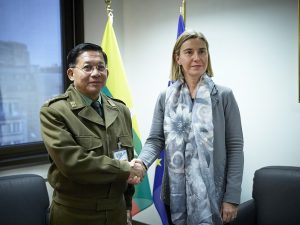Myanmar’s Union Election Commission (UEC) has officially rejected claims by the country’s military that last year’s election was marred by voter fraud, days after an army spokesperson refused to rule out a coup if its allegations weren’t investigated.
In a six-page statement on its Facebook page, the UEC stated that it was investigating 287 complaints, but that on the whole, voting was conducted fairly and transparently on November 8. “In this election, weaknesses and errors in voters lists cannot cause voting fraud,” the commission said.
To most outside observers, the result of the election was about as decisive as it gets. Driven by the enormous popularity of its leader Aung San Suu Kyi, the ruling National League for Democracy (NLD) won 315 of the 440 seats in the lower house of the Union Parliament and 161 of the 224 seats in the upper house. In total, the NLD won an astounding 83.2 percent of those seats up for election on November 8.
Since the election, however, the Myanmar military and the Union Solidarity and Development Party (USDP), the military’s electoral proxy, have persisted in claiming that the election was marred by fraud. For weeks, the army has alleged widespread voter irregularities, and this week claimed to have identified 8.6 million individual cases of fraud.
Perhaps unsurprisingly, the election also saw a further hemorrhaging of support from the USDP, which managed to win just 33 seats in the Union Parliament, a paltry 6.9 percent of those up for election. Across the country, senior members of the party – many of them former military commanders – were soundly defeated, and the NLD even made inroads into regions previously seen as USDP strongholds.
But this quixotic and slightly absurd campaign against the election has taken a turn for the ominous as the newly elected parliament prepares for its first sitting on February 1, spiraling into rumors of a possible military coup amid heightened tensions between the civilian government and the Tatmadaw.
Earlier this week, military spokesperson Maj. Gen. Zaw Min Tun warned the military would “take action” if its demands to investigate irregularities were not met, and declined to rule out a coup.
“Not resolving this in line with the law means this is a political crisis,” he told reporters in Myanmar’s capital Naypyidaw. “We do not say the Tatmadaw will take power. We do not say it will not as well,” he added.
The chief of the army doubled down the following day, claiming that if there is no movement on an election probe, Myanmar’s 2008 constitution could be scrapped.
In a televised address, Commander-in-Chief Sen. Gen. Min Aung Hlaing emphasized the need to “respect and abide by” the constitution, but added: “If one does not follow the law, such a law must be revoked. I mean if it is the Constitution, it is necessary to revoke the Constitution. If one does not follow the law, the Constitution must be revoked.”
He also referenced the past abrogation of the 1947 constitution (in 1962) and the 1974 constitution (in 1988), both of which were followed by lengthy periods of direct and repressive military rule.
As if to underscore his threat, armored vehicles appeared on the streets of Yangon and other major cities on Thursday, nominally for “test driving,” in a clear sign of muscle flexing on the part of the Tatmadaw.
The threats mark a sudden intensification of the long-standing rivalry between the NLD government and the military, in particular, the deep mistrust between Aung San Suu Kyi and Min Aung Hlaing. Despite being the two most important figures in Myanmar politics, the two have reportedly barely exchanged words in years.
Tensions between the civilian government and the military are in some ways built into the constitutional structure of Myanmar’s politics. The current constitution, drafted and forced through by the ruling junta in 2008, safeguards the military’s central role in Myanmar’s political life, granting it control of a quarter of parliamentary seats and three of the most important ministries.
But the rapid fading of the USDP into electoral irrelevance has suddenly sharpened the civilian-military divide: it has reduced the influence of the military over the legislative branch of government, raising the prospect of reforms to the constitution that would erode its influence further, while strengthening the NLD’s determination that it has an electoral mandate to govern on its own terms.
In this context, the hints of a military takeover are best seen as an unsubtle reminder of where the real locus of power lies in Myanmar, and a warning that the NLD should bend to the Tatmadaw’s will. If it refuses to submit, a coup is not outside the realms of possibility for a nation that recently emerged from a half-century of military dictatorship.
“I don’t think anyone can say with any certainty what might happen over the next three days,” the historian and author Thant Myint-U said on Twitter. “What’s likely is that Myanmar’s veering towards its most acute constitutional crisis since the abolition of the old junta in 2010.”

































